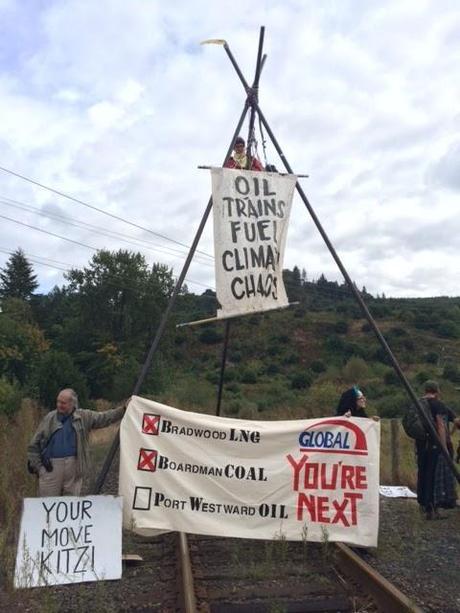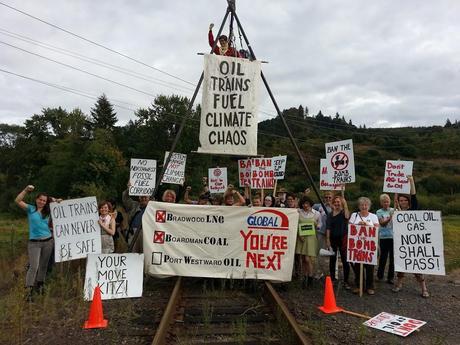
photo courtesy Portland Rising Tide
from Earth First! Newswire
Clatskanie, OR—Climate justice activists, local Clatskanie farmers, and oil train opponents from all over Columbia County are blockading the tracks that lead to Port Westward on the Columbia River. The blockade consists of a 20-foot-high tripod of steel poles, its apex occupied by 27-year-old Portland Rising Tide activist Sunny Glover.
Any train movement would risk her life, as would any attempt to remove her from the structure. A banner suspended from the tripod reads: “Oil trains fuel climate chaos.” She has vowed to stay as long as she is able. Massachusetts-based Global Partners ships oil by rail from the fracking fields of the Bakken Shale to the blockaded facility.
From there, it is loaded onto oceangoing vessels bound for West Coast refineries. The facility was constructed with public clean energy loans and tax credits to manufacture ethanol in 2008. The owners declared bankruptcy almost immediately, and in a twist of savage irony, it became a crude oil terminal.
“Fossil fuels are catastrophically destructive,” Glover said. “Extraction ravages land, water, and the health of local communities – transport results in deadly explosions, toxic spills and dust – and as they are burned, the Earth is forced ever deeper into immense climate instability. Fossil fuel production is violence, and on an incredibly vast scale.”
Dozens are joining Glover on the tracks.

Photo courtesy Portland Rising Tide
The increase in US oil production in recent years, and the consequent rise in oil train traffic, has outraged a diversity of groups and communities. Rising Tide activists, hoping to deter the most severe effects of climate change, are demanding a rapid dismantling of fossil fuel infrastructure throughout the region and the world.
Residents of areas effected by oil train traffic are horrified by the propensity of Bakken crude trains to derail in fiery explosions—a May, 2014 emergency order by the US Department of Transportation describes the trains as an “imminent hazard.”
Residents of the patchwork of farms, dikes, and waterways north of Clatskanie are fighting to protect agricultural land and salmon habitat from industrialization.
“When the crude oil trains began rolling through Columbia County, we had no prior warning—not from DEQ, not from the Port of St. Helens, not from the county, and not from the State of Oregon,” said Nancy Whitney.
“With the close proximity of our towns, and particularly our schools, and considering the track record of crude oil derailments, my fear is that the potential devastation from leakage or explosion could be astronomical—and it will happen unless these trains are stopped.”
This is the fifth oil train blockade in the Pacific Northwest since June.
“This is only the beginning,” said Noah Hochman. “We will continue to blockade until it is financially, logistically, and politically untenable for oil trains to threaten climate and communities.”

